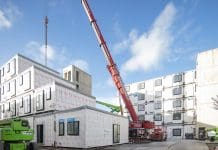As the British Automatic Fire Sprinkler Association (BAFSA) turns 50, its sprinkler ambassador, Nick Coleshill, reminds us of why fire sprinklers should form an essential component of any building’s safety strategy
BAFSA is the UK’s leading professional trade association for the fire sprinkler industry and its primary objectives include providing authoritative information on the benefits of fire sprinkler systems and how fire sprinklers can play a significant role in saving life and property from the devastating effects of fire.
To this end, BAFSA works closely with government, FRS, building control officers, insurers, architects and town planners.
Fires are adverse events. They are destructive, with their knock-on effects including the toxic and corrosive effects of smoke and the environmental effects of fire water from firefighting operations.
BAFSA’s aim is to enhance protection against fire through the increased acceptance and use of fire sprinklers.
We do this by encouraging and promoting the installation of sprinklers and other forms of AFSS to help drive a culture change so that they are understood and accepted as the norm and not the exception for the United Kingdom.
One way to achieve this is by working with our FRS representatives and sprinkler industry colleagues to collate and report sprinkler activations.
The details of these incidents are published on our website, sprinklersaves.co.uk, and provide further evidence of the reliability and effectiveness of sprinkler systems.
Detailing these sprinkler activations supports the findings of UK research commissioned by the NFCC, NFSN from Optimal Economics that revealed that:
- Sprinklers are 99% efficient in extinguishing or controlling a fire.
- Sprinklers are 94% efficient in their ability to operate.
Not only that, sprinklers provide a further layer of safety from fire as part of a package of fire safety measures. Effective fire protection requires both passive and active elements working in unison.
This use of a combined approach plays a significant role in reducing the impact of fire on people, reducing the risk to firefighters, property and the environment.
Fire sprinklers prevent damage to the environment
Not only do sprinklers help to reduce fire loss, but they also prevent damage to the environment, reducing carbon emissions and reducing the use of water from the resulting firefighting operations.
It is not uncommon to read press reports following a fire involving AFSS focusing more on the water damage within the premises at the conclusion of the incident compared with the successful activation of the AFSS, containing, controlling or extinguishing a fire.
This ignores the positive impact of sprinklers in preventing the threat to life from a fire, the production of toxic products of combustion, the water damage from firefighting activities and the potential significant damage or total destruction of the affected building.
To help mitigate the water damage that can result from sprinkler activations, robust emergency plans should be available that will allow the provision of vital information for the FRS to be shared by onsite representatives.
Clarifying the location and provision of key elements of active fire safety systems, such as sprinklers, will assist in developing an effective and robust onsite emergency response to control the sprinkler system during and following a fire so that it can easily be reinstated.
To download the latest free edition of BAFSA’s Sprinkler Saves Review, visit www.bafsa.org.uk and click on Publications.
BAFSA gathers together fire safety stakeholders at House of Lords

BAFSA held a special anniversary lunch at the House of Lords in February where it invited 50 key stakeholders from across the fire safety sector and honoured guests including Lord David Goddard, Sir Ken Knight, Bob Blackman MP and Ronnie King OBE.
The lunch saw the premiere of a short 50th anniversary video, narrated by broadcaster and fire safety campaigner Nick Ross CBE, that celebrates BAFSA’s achievements and the gains made in sprinkler legislation over the last half century.
BAFSA’s chief executive Ali Perry said: “Nothing BAFSA has achieved in the past 50 years has been done in isolation. It has been delivered through real partnership because of the passion, drive and determination of the people in this room.”
The occasion also saw the presentation of the first John McCann award for a significant contribution to the sprinkler industry, which went to Dr Simon Bird. The award is sponsored by Vipond Fire Protection in memory of its former MD John McCann, who passed away in 2022.
Perry added: “At the time of his passing, John was the chair of BAFSA, a leading advocate for all things sprinklers and was instrumental in driving the wider adoption of fire sprinklers and change within our industry. It is fitting in memory of John that we can make the first presentation of this award here at the House of Lords for BAFSA’s 50th.”
Nick Coleshill
Sprinkler ambassador
British Automatic Fire Sprinkler Association




![[Video] Enhancing safety with fire doors: A case study of Marina Care Home](https://www.pbctoday.co.uk/news/wp-content/uploads/2025/06/maxresdefault-218x150.jpg)



![[VIDEO] Making DorTrak reports easy to read with Fireco Inspecting fire doors at Fireco, firedoor technology, 2023](https://www.pbctoday.co.uk/news/wp-content/uploads/2024/04/JPZ_2364-web-218x150.jpg)





![[VIDEO]What to expect when you’re inspecting: Using DorTrak for fire door inspections](https://www.pbctoday.co.uk/news/wp-content/uploads/2025/02/maxresdefault-218x150.jpg)